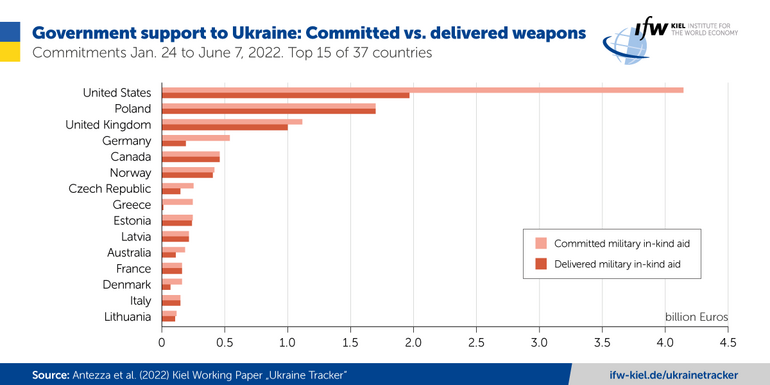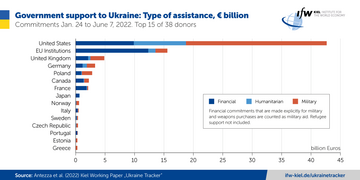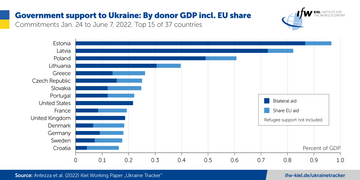News
Ukraine Support Tracker: International support is coming in with long delays
The volume of pledged weapons assistance - including heavy weapons - has notably increased in recent weeks (data collected through June 7). However, the difference between pledged and actually delivered arms can be very high. Among the major suppliers, the USA and Germany in particular have pledged significantly more than they have delivered, although in absolute terms the U.S. has already delivered weapons worth around ten times more than Germany. Poland and the UK have pledged and delivered significantly more than Germany. Canada and Norway have made slightly lower pledges, but also delivered much more. "The data show that Germany has made major announcements, but few actual deliveries. Unlike many others, it has not yet sent heavy weapons and only a third of the promised military support has actually arrived in Ukraine. This helps to explain the Ukrainian government's urgent appeals to the German government," says Christoph Trebesch, research director at Kiel Institute and head of the team that is compiling the Ukraine Support Tracker.

The volume of committed financial assistance has also increased significantly since mid-May, especially from EU institutions. In total, Ukraine has now been promised more than 30 billion euros in budget support by the most important donors, but only about 6 billion euros have actually been disbursed since February. The result is a growing financing gap. "Besides arms, financial aid is becoming increasingly urgent, as too little of it has actually arrived in Ukraine. The war is causing tax revenues to collapse and fiscal costs to skyrocket, e.g. to pay soldiers and to repair essential infrastructure. This puts the state budget under stress. The International Monetary Fund estimates that Ukraine needs about 5 billion euros in external financing per month, implying a sum of at least 15 billion euros as of June. Because foreign financial disbursements have been much lower than that Ukraine’s central bank now had to react with a sharp rise in interest rates, causing further economic pain," Trebesch said. “A further concern is that the EU aid mostly comes in the form of loans that need to be repaid, thus adding to Ukraine’s large debt burden. In comparison, the US hast mostly committed non-repayable grants.”


Overall, in the additional period now covered (May 10 to June 7), the EU's pledges of assistance to Ukraine visibly caught up with the U.S., which however still leads by a wide margin. When the support is put in relation to economic size, the Baltic states and Poland continue to contribute significantly more than large European economies such as Germany, Italy, and France. "The support mobilized to Ukraine by the EU and its member states is still relatively small given what is at stake in this crisis. In response to the war, almost all EU countries have so far mobilized more funds for domestic spending priorities, rather than for Ukraine itself," says Trebesch.
About the Ukraine Support Tracker
The Ukraine Support Tracker lists and quantifies military, financial and humanitarian aid pledged to Ukraine since January 24, 2022 (currently through June 07, 2022). This new update covers 37 countries, specifically the EU member states, other members of the G7, as well as the newly added countries of Australia, South Korea, Turkey, Norway, New Zealand, and Switzerland. Also, EU institutions are included as a separate donor. The tracker lists government-to-government commitments; private donations or those from international organizations such as the IMF are not included in the main database. Flows going into other countries like, for example, Moldova, are not included.
With regard to sources, the database combines official government sources with information from international media. Aid provided in kind, such as medical supplies, food, or military equipment, is quantified on the basis of market prices or information from previous crises involving government aid. In case of doubt, upper bounds of prices are used.
The Ukraine Support Tracker is constantly being expanded, corrected, and improved. Suggestions are very welcome and can be sent to ukrainetracker@ifw-kiel.de.
More information and detailed data can be found on this webpage: Ukraine Support Tracker
